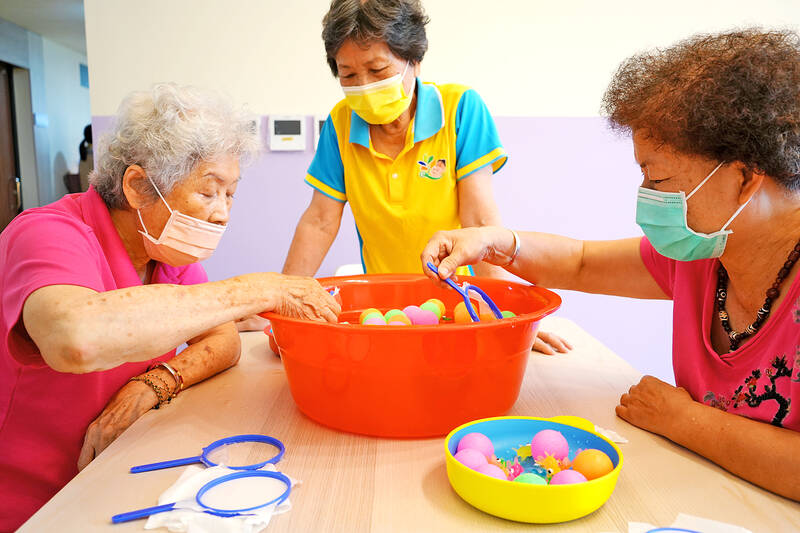Masks are no longer to be required in medical institutions from Sunday next week, the Centers for Disease Control (CDC) announced yesterday, officially ending all COVID-19 mask restrictions.
Masks would be recommended rather than mandatory in all medical institutions and centers for the elderly, CDC Deputy Director-General Tseng Shu-hui (曾淑慧) said following an expert meeting to assess the COVID-19 situation.
The decision was made after considering similar policies set by the WHO, as well as the US, UK and other nations, Tseng said.

Photo: CNA
Under the guidelines, those exhibiting respiratory symptoms should not enter medical institutions unless necessary, but if they do, they should wear a mask until at least five days after symptoms ease.
Those who have had close contact with someone exhibiting respiratory symptoms and those at high risk of developing complications are also advised to wear a mask in medical institutions, the guidelines say.
Those younger than two or who have trouble wearing a mask should cover their mouth with tissue paper when coughing or sneezing, and dispose of it after use.
Meanwhile, a statement about expiration dates on the 10 million free COVID-19 tests that the CDC plans to distribute to more than 4,500 National Health Insurance-contracted pharmacies nationwide has sparked concern among members of the public.
The 10 million kits have expiration dates ranging from the end of May to December, and 1.5 million of them would be effective until the end of December, but the majority of the kits would expire by the end of June, the CDC said on Tuesday.
Members of the public are concerned whether the efficacy of the test kits would be affected.
Food and Drug Administration Deputy Director-General Wang Te-yuan (王德原) yesterday said that “close to expiry” means the rapid test kits have not yet expired and can be used normally.
“If the test kits have expired, it is advised to dispose of them as general waste and refrain from using them,” he said.
Additional reporting by CNA

MAKING WAVES: China’s maritime militia could become a nontraditional threat in war, clogging up shipping lanes to prevent US or Japanese intervention, a report said About 1,900 Chinese ships flying flags of convenience and fishing vessels that participated in China’s military exercises around Taiwan last month and in January have been listed for monitoring, Coast Guard Administration (CGA) Deputy Director-General Hsieh Ching-chin (謝慶欽) said yesterday. Following amendments to the Commercial Port Act (商港法) and the Law of Ships (船舶法) last month, the CGA can designate possible berthing areas or deny ports of call for vessels suspected of loitering around areas where undersea cables can be accessed, Oceans Affairs Council Minister Kuan Bi-ling (管碧玲) said. The list of suspected ships, originally 300, had risen to about 1,900 as

Japan’s strategic alliance with the US would collapse if Tokyo were to turn away from a conflict in Taiwan, Japanese Prime Minister Sanae Takaichi said yesterday, but distanced herself from previous comments that suggested a possible military response in such an event. Takaichi expressed her latest views on a nationally broadcast TV program late on Monday, where an opposition party leader criticized her for igniting tensions with China with the earlier remarks. Ties between Japan and China have sunk to the worst level in years after Takaichi said in November that a hypothetical Chinese attack on Taiwan could bring about a Japanese

The WHO ignored early COVID-19 warnings from Taiwan, US Deputy Secretary of Health and Human Services Jim O’Neill said on Friday, as part of justification for Washington withdrawing from the global health body. US Secretary of State Marco Rubio on Thursday said that the US was pulling out of the UN agency, as it failed to fulfill its responsibilities during the COVID-19 pandemic. The WHO “ignored early COVID warnings from Taiwan in 2019 by pretending Taiwan did not exist, O’Neill wrote on X on Friday, Taiwan time. “It ignored rigorous science and promoted lockdowns.” The US will “continue international coordination on infectious

DEEP-STRIKE CAPABILITY: The scenario simulated a PLA drill that turned into an assault on Taiwan’s critical infrastructure, with the launchers providing fire support Taiwan yesterday conducted this year’s first military exercises at Longsiang Base in Taichung, demonstrating the newly acquired High Mobility Artillery Rocket System’s (HIMARS) ability to provide fire support and deep-strike capabilities. The scenario simulated an attack on Penghu County, with HIMARS trucks immediately rolling into designated launch areas and firing barrages at the Wangan (望安) and Cimei (七美) islands, simulating the provision of fire support against invading forces. The HIMARS are supposed to “fire and leave,” which would significantly increase personnel and equipment survivability, a military official said. The drill simulated an exercise launched by the Chinese People’s Liberation Army (PLA) Eastern